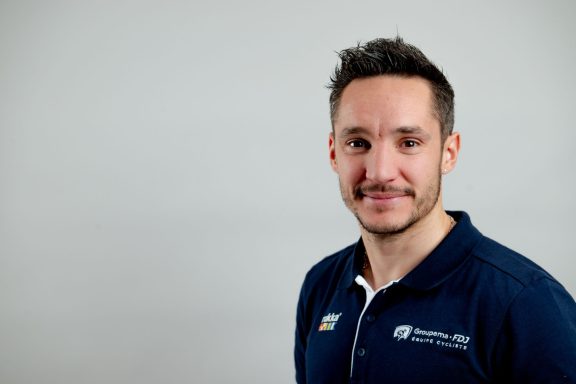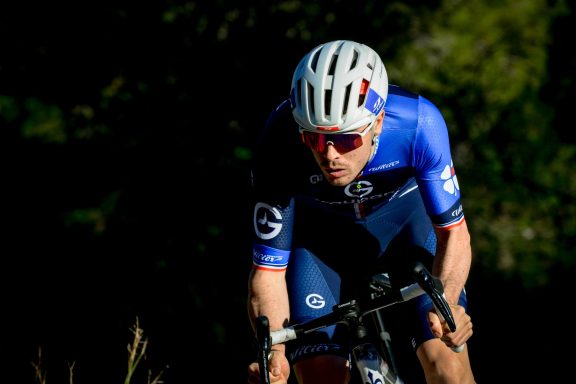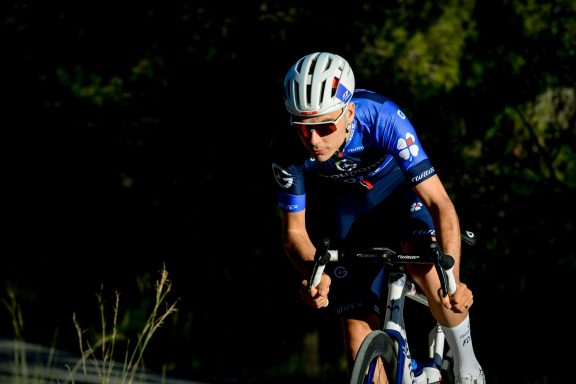An eventful 2024 season is about to come to an end for Thibaud Gruel. After he made a definitive and earlier switch than planned from “La Conti” to the Groupama-FDJ WorldTour team last March, the 20-year-old found his bearings quite fast with “the big boys”. A brilliant top-10 finisher in the Bretagne Classic, the puncher from Tours talks about this very special year, as the last races loom, and not the least.
Thibaud, we are on the eve of the U23 world championship. How do you feel?
Very good. I am in pretty good shape in this second part of the season, and I really hope to do well in this world championship. I have only competed in it once, in Australia, when I was a junior. I like this event, with the French team atmosphere, racing for the rainbow jersey… Physically, I was doing well in training, and I was also doing pretty well in the last few hard races that I competed in. I don’t think the World Championship can be harder than the Grand Prix de Montréal (smiles). It was definitely good preparation, and it can only be useful on Friday.
“I would like to be able to play my card”
What do you expect from this race?
We have a solid group with the French team. We have several cards to play, which can allow us to be there in all possible scenarios. We also know that in the U23 category, the race doesn’t necessarily unfold the same way as in the WorldTour, and it’s not always the strongest who wins. I would like to be able to play my card, but we’ll see when I’ll come into action depending on the coach’s strategy. If I have the opportunity to fight for the title, I’ll grab it 100%. I don’t set myself any limits, even if there will be a high level with some WorldTour riders coming to compete in the U23 World Championships. For instance, there are the UAE Team Emirates’ riders I used to race in juniors with: Antonio Morgado, Jan Christen, Isaac Del Toro. But there are also other very strong riders who are not in the WorldTour like Joseph Blackmore who won the Tour de l’Avenir.
This is also the last time that WorldTeams and ProTeams riders will be able to take part in the U23 World Championships. What do you think of this new regulation?
To be honest, it seems quite logical to me. I think it’s pretty good that the riders who have been fighting against each other all season in the Class 2 and U23 races are once again facing each other at the World Championships, without WorldTour riders coming back to get involved. I say that even though I’m doing it myself this year, but I started the season thinking I was going to compete at the continental level. I had this race in mind very early on, and I even talked about it with the national coach. Even if the regulations hadn’t changed, I think it would have been my last U23 World Championship. Once you join the WorldTour, you have other goals…
Let’s go back in time. In early March, the team tells you that you’re going to join the WorldTour team with immediate effect, at 19 years old. Can you tell us about that moment?
It really was a surprise. My phone rang and Marc Madiot’s name came up. I didn’t know what to expect. He then told me that they were considering making me join the WorldTeam in March. He was honest with me, he explained that the team had a lot of injured riders. But I had also done 100% of the start to the season with the WorldTeam, and he told me that I had given total satisfaction, that the team was happy with my work, with what I did, and that they had confidence in me. It was a surprise, but also great news. It all happened quite fast, but they also took the time to explain to me why, how it was going to happen and how my schedule was going to be modified.
“I really had nothing to lose”
Were you a bit nervous when they told you you’d be taking the next step earlier than what was planned, which was 2025?
Actually, I was mostly afraid that my entire race schedule would be turned upside down. But we eventually managed to keep the races that I wanted to do and the goals that I had set for myself with La Conti. I did not feel nervous about the races themselves. On the contrary, I was going to discover them, and I really had nothing to lose since it was an anticipated switch. I only felt excitement. I did not expect to be the strongest in the races this year. I was quite aware that at the WorldTour level, in particular, I would be facing stronger riders than me. I did not ask myself these kinds of questions. I simply told myself that I would go to the races and do what was asked of me as best I could. I also told myself that if the team had trusted me, it was probably because I had the required level. I wasn’t too scared about that. In addition, thanks to the exchanges between the two teams, I had already had the opportunity to do some races beforehand and to realize I could do well. I was quite serene. And if I hadn’t been, everyone would have been there to help me. At the end of the day, it’s still cycling. In the peloton, we’re all human beings with two arms and two legs.
Before really joining the WorldTeam, you ended your time with “La Conti” by scoring its first victory of the year. It’s a nice way to say good-bye.
For sure, especially that I won the Circuit des Ardennes like the previous year, on a similar finish. It felt like the circle was complete, and I’m really happy to have been able to win a race with “La Conti” considering the few days I’ve raced with them this season. I still had goals afterwards on Liège-Bastogne-Liège U23, then on the Giro NextGen, where we unfortunately weren’t invited. That being said, racing a little bit more with “La Conti” meant I was able to continue to fight for the win in certain races, which also made the transition smoother.
How did your daily life change with the move from “La Conti” to the WorldTeam?
I was already based in Besançon since I was supposed to do the whole year with “La Conti”. I preferred to stay there and finish this season rather than return home to Tours where the terrain is a bit less hilly. The area around Besançon is really nice to train on. So from this point of view as well, the transition was smooth. As I stayed there, my lifestyle remained more or less the same. I was with my mates from “La Conti”, we would ride together from time to time, and I could also take advantage of the Performance Centre facilities, massages, cryotherapy, or the mechanics. My coach was also there, which sometimes allowed me to do some motorpacing sessions. I don’t regret staying in Besançon at all. There were a lot of benefits.
“I’m quite aware that I was there to learn”
In April, you made your WorldTour debut in the Tour de Romandie. What struck you first?
What struck me, even before the start, was the density and the overall level. There were only WorldTeams, or almost, and only strong riders, who I know very well from the TV. Then, the way of racing is different. It is more organised than in Class 2 races. But once it gets going, it doesn’t stop. In Class 2 races, when it goes full gas and you turn around, there are only twenty guys left. In Romandie, I turned around and everyone was still there! You just realise that this is what high-level racing is. It didn’t worry me too much because it was a WorldTour event, and I had to adapt. I was still able to score two top-10s during the week, which was very good, especially since that wasn’t necessarily the goal. I just seized opportunities in the sprint when I had the chance once I had done my job for Lenny and David.
Overall, how did you experience these first months with the WorldTeam?
In terms of integration, it wasn’t a problem at all. I had already done the winter training camps and raced a lot with them before. I adjusted quite well. From a sporting point of view, I took a break after the Tour de Romandie, and it took me a little while to get back on track. I wanted to be in the mix for the French championships, but I didn’t get in great shape before the summer. Having raced the Polynormande, the Tour du Limousin and the Tour du Poitou-Charentes really gave me a boost for the end of the season with the Bretagne Classic and the Canadian Classics in particular, where I found good legs again. I just had a bit of a dip in the middle of the season, but I don’t feel like I had to digest the switch. On the contrary, I actually feel like I’ve done one single season, without any real change.
You also mostly took on a domestique role while you were often a leader in the young categories. Was it easy to switch from one to the other?
It depends on each person’s mentality. It’s neither easy nor difficult. Sometimes it’s a bit frustrating, but once you’re there racing, you do what you have to do when you have to do it. And you also have to be honest: you also know that the leaders are stronger than you, that you couldn’t do what they do. I was domestique a lot, but I’m quite aware that I was there to learn and that it was normal for my first season. I had no problem doing it, but I didn’t tell myself that I wanted to do that my whole career either (smiles). When you’ve often been a leader, it also makes you realize what it’s like. It opens your eyes to some details, and you understand even more what others do for you when you are the leader. It is interesting to have this point of view.
“On the Bretagne Classic, I didn’t know how much I could trust myself”
When did you start to feel really comfortable racing with the “big boys”?
As in any season, there are times when you feel more or less good. In the times I felt really good, I felt I could be more or less active in certain races, or at least to be there when things got harder. It gives me hope for the future. There are also times when I thought: “this is a different world, I am far from it”, but it was mainly when I was not in great shape. Actually, I got this feeling of being able to be active at the higher level even before my move to the WorldTeam. I think of Paris-Camembert. I was in the mix in all the climbs, but I made a stupid mistake in positioning on the last one and I found myself in a second group while I could totally be up front. I could have made a much better result that day (14th, editor’s note). I was disappointed with the result but after the race, I told myself: it’s possible to be up there from time to time.
In late August, you finished eighth in the Bretagne Classic at WorldTour level, a year after finishing eighth in the amateur race. Does it say a lot about how far you’ve come?
Symbolically, it means something indeed. There were 260 kilometers, 6 hours and 15 minutes of racing, and I was just excited to compete in such a long Classic. I wasn’t really scared, I was just looking forward to seeing how it would go and what I would be able to do. In the end, I felt really good, I was quite well positioned throughout the race, and I followed the first group. It was my first time in such a Classic, so I didn’t know how much I could trust myself and how my body would be able to react. I didn’t dare to attack, I just followed and sprinted at the end. But to still be there after 6h15, 260 km and not struggle completely, that was really good. It remains a great memory of this season.
We also saw you in good form in Hamburg and then in Canada.
I felt very good in those races. In Hamburg, it was a bit unusual because the race had been shortened and Paul had crashed out. There was a steep climb to do three times in the final, and that suited me very well because it was a one-minute-thirty effort. I was in a good position on the last climb, no one had really attacked, so I thought I would go myself because I was not going to beat Olav Kooij in the sprint. In Canada, I didn’t get any results, but the legs were good. I just lost a bit of energy at certain points for details, but we had big leaders anyway and I helped them as much as possible. In Montreal in particular, it was really really hard, and when things started to explode, I was still up there, and I was able to help Romain, Val, and Rudy until late in the race. It was surely positive, and being able to do that in very high-level races gave me confidence.
“Being a leader and trying to win races, that’s all I ask for!”
Before the very last races, how do you assess your season?
It’s been a pretty good season. First of all, I have a victory in the bags, and at least that’s something! I also have three top-10s in the WorldTour, including one in a Classic, which is not insignificant. I can say that this season is a success because if someone had told me that I would do that on January 1st, I wouldn’t have believed it! I didn’t even think I’d be racing in the WorldTour before 2025. I’ve improved well, and at the age of 20, that’s the most important thing. I’m pretty happy with the transition from “La Conti” to the WorldTour. I’ve been trusted in a lot of high-level races, and I wanted to prove that the team could trust me and that I had the level to compete in these races. I’m pretty happy overall, and I hope the team is too.
Given the end of the season you’ve had, do you already feel ready to take on more responsibilities or do you still need time?
At 20, you’re always excited, and you want to fight to win right away, like you used to do as a U23 rider. The team is also there to tell me when I can go for my own chance or when I should support another guy. But being a leader and trying to win races, that’s all I ask for! It is also decided based on the form and the line-up in the race. For now, I haven’t been a leader very much, which is normal because I joined the team during the season. Everything can’t come at once, it would be too fast. You have to learn, but I feel that the team trusts me when I am in form. Everyone sees that I am improving, at my own pace, and that it will be possible to give me responsibilities as I go along, but without rushing things. I know that if I continue to progress, it will come. In the meantime, I am also learning by being around the leaders, by seeing how they behave. You also realize that it is much harder to be a leader. When everyone is on the limit, the domestique can take it easy after doing his job. The leader, on the other hand, has to be there until the end. It is harder mentally, physically, and you also have to have steady nerves.
What will your program be after the Worlds?
I’m supposed to go to the Italian Classics campaign, but we will have a larger group there, so I don’t know yet exactly which ones I will compete in.



No comment